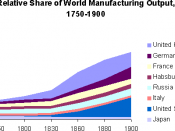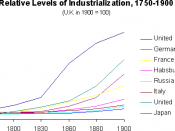�PAGE � �PAGE �6�
Industrialized Versus Non-Industrialized societies
Cheryl Jarmon
Anthropology 101
Curtis Armour
July 27, 2007
Industrialized Versus Non-industrialized Societies
The definition of success varies between cultures and individuals, depending on their goals in life. A prime example of this differentiation exists between members of industrialized and unindustrialized societies, due to the great variation in their member's day to day lives and value systems. Many of these differences become apparent when one examines the daily existence of the individual for example, the acquisition of basic food and shelter.
Britannica Encyclopedia defines industrialization as "the process of converting to a socioeconomic order in which industry is dominant." Industrialization can be traced back in England during the early part of the 18th century. Reasons for such include the development of surplus capital because of the industrial revolution, cottage industry, established commercial industry in England, the need for alternative material in the textile industry.
Their industrialization pursuits sought to solve certain problems in the textile industry, energy, and transportation.
Advantages of industrial revolution include higher GNP, higher rate of urbanization, less infant mortality, increased number of high school graduates, more telephone usage, higher output in steel production, various benefits to consumers, stockholders and laborers, and the opportunity for big businessmen to get involved in philanthropy.
Disadvantages, on the other hand are child labor, necessity to protect wage-workers, and meager living conditions. Aristotle observed the differences he saw in cultures of people residing in industrialized societies to those of non-industrialized societies he said the differences in cultures can be noted in different levels such as family cultures, company cultures and functional cultures.
In a non-industrialized society, members frequently reside in close-knit communities. This is often the case due to the daily pressures of substance living; that is, growing one's own food supplies and maintaining living quarters. Non-industrialized societies typically require a greater amount of manual labor input to sustain them and in that light of the majority of its people will spend most of their time farming and raising animals for food. Such work is typically done more efficiently when efforts between individuals are coordinated, therefore encouraging group cooperation. An individual in such a society would likely deem themselves successful if they succeeded in furthering this group dynamic they would be a successful farmer and an active member of their community.
Industrialized societies however, place far less emphasis on the community and more on the individual. Members gain the benefit of greater automation in their everyday lives, and therefore can spend less effort in acquiring basic living needs, and can focus more of their time on more complex activities such as trade. Since basic things like food and shelter are more plentiful, the individual would begin to take these things for granted and not use them as a measure of success. Instead, they would consider themselves successful if they did well in their business interests (the president of a highly valued company, for example) or owned a large amount of "luxury goods-that is, personal possessions not needed for survival (such as a nice car, ostentatious house or fancy electronics).On the opposite end, societies supposedly place more value on achievement, success and competition.
Certainly there is a point at which the beliefs and attitudes, and habits of two societies are so different that the two must be regarded as different cultures, but there are also borderline cases (Moore, 2007). Western society is entirely considered for those who are self-indulgent and self-absorbed and self-centered people. To characterize today's industrialized world as a slave culture and we find ourselves becoming more self-centered and separated from each other.
The issue here is whether or not industrialization has something to do with the success of an individual. Does and industrialized society guarantee the success of its citizens? Living in an industrialized social instills challenge to people because it entails competition a need for survival. It creates a mentality that one has to go out of his comfort zone to meet the demands of his society; otherwise he would be left out. One would eventually think of ways to make himself capable enough by doing self-enhancement undertakings such as studying further and learning new skills.
In contrast, living in a non-industrialized society might create an impression to its people that everything is doing fine and that extra effort is not really necessary. Moreover, production of a wide variety of beneficial products will be constrained due to limited resources. People in non-industrialized societies tend to be more complacent since they could already feel satisfied in simple living.
For instance, Paul lives in a modernized area. He is typical yuppie who lives alone in a condominium. His primary concern will mostly likely be his finances. In most companies, the position and the salary of an employee depend on his educational background. Thus, Paul world would want to pursue a master's or even doctorate degree to get a higher position later on. Since his current salary does not seem enough to pay all his expenses, he would look for other means to have extra income. He would also strive really hard to success in his every pursuit to stay in a surviving level. Failure for him would mean a greater barrier toward the fulfillment of his goals.
In contrast, Fernando lives in a remote, non-industrialized rural area. His daily life is very simple, dull and mundane. Most of his neighbors have the same lifestyle. There are not a lot of activities to do in their areas. There are also no formal schools. Growing up, he is never aware of the value or the concept of education. Thus, he already feels satisfied with what he has since he does not see the need for further pursuits.
It can be concluded that the kind of society greatly shapes its individuals. It makes people see various needs, prompts them to find ways to sustain those needs, and creates in them certain pressure to be responsible for themselves in order to succeed and survive. Absence of industrialization in a society tends to limit one's knowledge and experiences and create less sense of challenge among its individuals.
Works Cited
(n.d.). Retrieved July 28, 2007, http://www.emayzine.com/lectures/indust-2.htm
Answers.com (n.d.). Retrieved July 28, 2007, from http://www.answers.com%22 industrialization%22?cat=technology.
Document-based Essay on the Advantages of Industrialization. (n.d). Retrieved July 28, 2007, from www.emsc.nysed.gov/cial/socst/pub/4samus.pdf.
Moore Brooke N. Parker R., (2007) Critical thinking, 8th Edition, Mc Graw Hill Inc.





